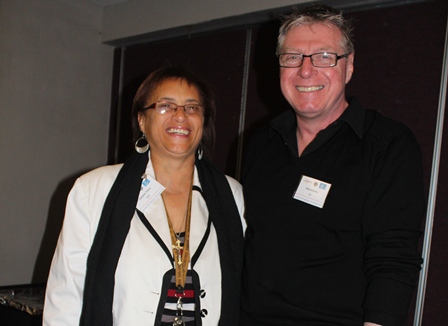In celebration of International Open Access Week, DUT’s e-Learning Project, in partnership with the University’s Library Services unit, held a two day symposium titled Generation Open – The Promise of Open Access and Open Educational Resources which took place at the DUT Hotel School, Ritson Campus, from Monday this week (20 October 2014) to Tuesday (21 October 2014).
Researchers and students from the University, as well as other university colleagues in South Africa, came together to explore the benefits of Open Access, share and inspire wider participation in learning more about the benefits and potential of Open Access and to help to make Open Access a new norm in scholarship and research.
Open Access refers to free access to research materials for research and publication. Open Access comes in two degrees, one being gratis open access which is free online access and libre open access, which is free online access plus some additional usage rights. The symposium was also a means of learning more about leveraging open educational resources. With open educational resources expanding rapidly, academics, researchers and students were keen to learn how to make open educational resources work for their respective universities.
Widespread public access to the web in the late 1990s and early 2000s fueled the open access movement. Conventional non-open access journals cover publishing costs through access tolls such as subscriptions, site licenses or pay-per-view. Some non-open access journals provide open access after an embargo period of 6 to 12 months or longer. Active debate over the economics and reliability of various ways of providing Open Access continues among researchers, academics, librarians, university administrators, funding agencies, government officials, commercial publishers, editorial staff and publishers.
One of the keynote speakers was Professor Laura Czerniewicz from the University of Cape Town. She spoke about the new environment of Open Access and Open Educational Resources. Her presentation focused on open content, online courses and MOOC (Massive Open Online Course) which is an online course that has open access and interactive participation by means of the web. “If one uses open content, it’s no cost to the user. However, with online courses, one has to pay fees, and for MOOC, it’s no fees.
The lecturer’s role with regard to open content is that he or she needs to have content knowledge and basic curriculum design. With online courses, the lecturer’s role is to be responsible for the curriculum alignment and support and in terms of MOOC. The lecturer’s role is flexible but with limited individual support,” she said. She also added that using open content was more cost effective, saving students money and in terms of legality, it was under open licenses which could be legally used and adapted. Prof Czerniewicz was, until recently, Director of the Centre for Educational Technology at UCT. She now leads the University’s Open Scholarship Initiative: OpenUCT, which gives access to open teaching and learning content.
Another keynote speaker, Prof Alan Amory from the University of Johannesburg, gave more insight into designing teaching environments. He spoke about how technology should not be the unit of the analysis, but the part of a learning process. “The problem under investigation asks how education technology and interactive learning environments that support learning and individual transformation can be designed to support collaborative social problem solving activities,” he said. Prof Amory is also the principal author of the Open Learning System (OLS), developed at and used by the University of KwaZulu-Natal. He is also a recipient for the prestigious South African Government’s Innovation Fund Award.
Speaking on the role of publishing such as digital e-books, with regards to Open Access was Melvin Kaabe. He is the Digital Manager of Van Schaik Bookstore. Melvin spoke on e-textbooks as a tool for student learning and how the mobile revolution affects learning. Melvin is responsible for the Van Schaik’s digital strategy, is a board member of PUKU Foundation for Children Literature and is also on the digital steering committee of the Publishers Association of South Africa.
Panel discussions were also held with various staff members regarding innovative teaching practices and how to produce Open Access materials for teaching at DUT.
Summing up the event was Prof Graham Stewart, Associate Professor and e-Learning Co-coordinator at DUT. He said it would be recommended that an Open Access Research group be formed at DUT to discuss the way forward, and that the University needs to look into the idea of conceptualising a policy to work through the existing structures.
– Waheeda Peters
Pictured: DUT’s Revd Dr Delysia Timm with keynote speaker Prof Alan Amory from the University of Johannesburg, at the two-day symposium.


